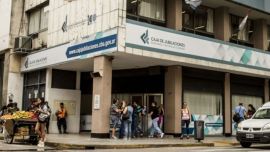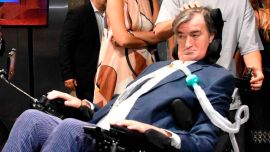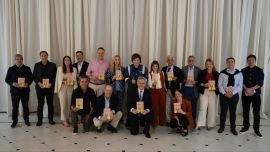At a hospital in Florencio Varela, Buenos Aires Province, two men closed their eyes. They did not know that they would spend over 60 days in an intensive care unit together, narrowly avoiding death.
Both survived but months on, since contracting Covid-19, both have been recovering from the profound experience they went through.
The intensive care ward of the Hospital de Alta Complejidad El Cruce Néstor Kirchner has been swamped for the past year, ever since the coronavirus pandemic reached Argentina. Most people who enter with respiratory problems spend several weeks or even months there.
‘On that day I fell into a coma’
Raul Almirón, 45, is one of them. He still cannot believe that he is alive. He spent 170 days in intensive care, many of them in an induced coma.
"I saw many people die, I saw children bidding farewell to their parents through glass; I didn’t want my children to go through that.”
In late July, Almirón, a gardener, was working on a flower bed at exhibition grounds when he began to feel rotten.
At that point it did not cross his mind that he might be infected with coronavirus. "Until I started feeling a lot worse," he recalls.
On August 1 they transferred him to El Cruce. "On that day I fell into a coma," he nods.
Overweight and suffering from high blood pressure, he had some serious complications associated with Covid-19. Raul entered hospital weighing 115 kilos and left it weighing 51 kilos less.
Minutes later, when the doctors advised him that they were putting him to sleep, Almirón closed his eyes and asked God "to give him one more chance."
A few months before becoming infected with coronavirus, he had separated from his wife, taking charge of their seven children aged between five and 23.
"I thought all the time about my children, about how they were going to live," said Raul.
When he woke up in late September, "I was wired all over – I could not believe how I was."
Things had changed considerably – the daily average of cases in Argentina was 14,000, with around 400 deaths every 24 hours. Hospitals were working to the limit. Now the country has surpassed three million cases of contagion and 65,000 dead out of a population of 45 million.
Raul says he suffered many hallucinations and almost all the complications caused by coronavirus. Several times his doctors thought he was going to die. Then came "the depression and the panic."
"It cost me a lot to come off the respirator; one day an orderly told me: look, I’ve got seven kids waiting for you." Then he plucked up his courage.
He learned to walk again but he’s still a long way from recovery. He cannot move one shoulder and lacks strength.
"My kids have to bathe and change me," he relates, speaking from inside the walls of his home.
‘I did not know if I was going to wake up’
Without getting to know one other, Almirón shared many days in the intensive care ward with Raúl Gutiérrez, 37.
The latter’s case, however, is quite different.
The owner of a gym in Buenos Aires Province, Gutiérrez was training intensely for a body-building competition in late 2020. But towards the end of June, after a family get together with his two daughters, he began to run a fever.
Shortly afterwards, in the intensive care ward, a doctor told him that they would be putting him to sleep in order to insert a tube into his windpipe to connect his lungs to an artificial respirator.
"I was terribly afraid because I did not know if I was going to wake up. I wrote to my father, my daughters and my girlfriend. I had never been to a doctor before, never had any aches and pains."
He opened his eyes 40 days later.
"I thought that they had abandoned me, all around me nervous doctors and nurses were coming in and going out with their face-masks, medical garb, glasses, etc. I could not move my arms or legs nor speak because of the tracheotomy."
He had a very rough time in those days. “I dreamed that I had already died, that this was my wake."
On September 5 they transferred him to intermediate care and a few days later he was discharged. Recovery has taken months.
"Now I value other things – I enjoy the simple, the basic."
Some after-effects remain: a lack of strength in his feet and of flexibility in his knees. There has been a strong psychological impact.
"I’m afraid of again undergoing what I had to go through."
He hasn’t stopped training although no longer with anabolic steroids. He does so alone or with his girlfriend – his gym seems almost abandoned due to the sanitary restrictions.
"I go one better every day – it should not be forgotten that mental willpower is very valuable."
related news
by María Lorente, AFP





















Comments